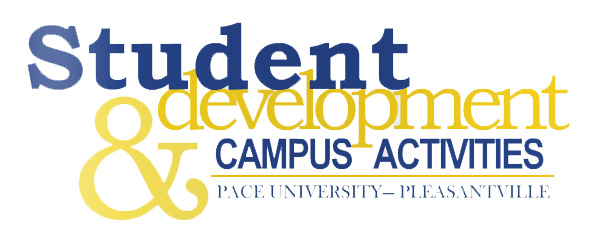
Greek letters and stories of the notoriously awesome fraternity parties bombard potential incoming students from the moment the lights turn on. The involvement fairs seem to be riddled with infinite Greek opportunities but fall short of mainstream prospects. What can be said when the first few months of school have passed and you find yourself wanting to get involved, but with something other than Greek life? When the Greek alphabet fails to resonate, there is a plethora of clubs and organizations eagerly awaiting a sign of interest in potential new members.
“Out of the 2400 undergraduate students on the Pleasantville campus, 330 are Greek,” said Associate Director of Student Development and Campus Activities (SDCA) Shawn Livingston. “864 students are either Greek, an athlete or involved in a student organization.”
In other words, only 36% of Pace students are active (Greek and secularly) on campus. With 35 student organizations, athletic teams, intramurals, programming teams, councils, and much more, shouldn’t the statistic of student-campus involvement be much higher? Part of the problem can likely be attributed to not knowing how to get involved. Luckily, Pace excels in providing a multitude of options in initial on-campus involvement.
“Our mission statement is, ‘to support and enhance the academic mission of Pace through leadership development, personal growth and campus programming,’” said Livingston. “We are here to better help students find what they need.”
SDCA welcomes anyone who wishes to better improve his experience at Pace by acting as the missing link between the student and the interest. One of the ways in which SDCA helps provide this link is through hosting an involvement fair at the beginning of each semester where all active clubs promote themselves and actually reach out to students.
In addition to the involvement fair, students looking participate in on-campus activities could always reach out to someone that they are already comfortable with, like an RA or a busy peer. Flyers are also great indicators as to campus happenings. “The Flush Flash”, a weekly calendar of campus events, is posted in every bathroom on campus and on the SDCA website. However, not all flyers are as successful as the “The Flush Flash”.
“I like seeing bright posters,” said freshman nursing major Gabriel Jackson. “I saw the advertisements at orientation, in emails and on the Facebook but they were very general and had nothing special.”
This can be said for much of the advertising on campus. The bland white paper with calligraphic print and a pixelated image will only grab so much attention in comparison to the flashy Alphas and Omegas plastering the rest of the occupied space. If not the advertising that Greek organizations manipulate to attain popularity, perhaps the appeal comes from the infamy of the parties, or the unexpected step routines at the school gatherings. While Greeks make it easy to become involved, secular clubs and organizations may well a reason for the undercover advertising.
“I joined the Accounting Society in January as an opportunity to meet potential employers,” said junior public accounting major Mike Saia. “Although my entering was very recent it has already helped me to land an interview with a well-known firm.”
The benefits gained from non-Greek organizations will present themselves when personal strides are made. Other students have taken initiative to indulge in their interests by creating an organization when few others were of interest.
“I founded the Chabad club and helped to start the Glee club,” said senior communications major and management minor Sarah Friedson. “I was so involved in Jewish life before college and couldn’t imagine my life without it so it was important to me that I continue in my religious ways.”
In most cases, there are other students who are looking to engage in activities that may not exist on campus. The Chabad Club, which Friedson has also helped to turn into a Hillel (an international on-campus Jewish organization), now has ten members. Although many clubs and organizations are small in numbers, those that are active must have dedicated members that see advantage in keeping the organization up and running. All clubs are formed around common interests that better help students to connect.
The smallest clubs on campus have thrown the biggest events. Colleges Against Cancer (CAC) throws the Relay for Life event every year, which even brings in community members. Desi Heritage of South Asia (DHOSA) puts on Bollywood night which is always a hit amongst every culture. Being involved doesn’t mean going Greek.
“Pace is about the every-day reconstruction of self,” said Livingston. “A private education allows many doors to be opened, but no one will push you into any of them. You have to knock.”
The soul search that takes place in college will not lead to success if optimum exposure is not acheived. Step out of your comfort zone and walk into the conference rooms in Kessel during any given common hour. Put your name on Muslim Student Association weekly email sheet. It’s okay to try out for cheerleading even though the only affiliation you have with the sport is as a spectator on Monday nights.
It’s not about what Pace can do for you, and not even about what you can do for Pace. What can you do to enhance your college experience and expand your realm of interest at the most exciting time of your life?
